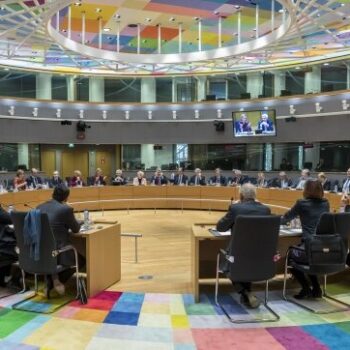The Gleneagles Dialogue on Climate Change, Clean Energy and Sustainable Development was initated under the UK Presidency of the G8 in 2005. The dialogue held its second ministerial meeting in Monterrey, Mexico from 2–4 October 2006.
UK Environment Minister David Miliband hosted an opening dinner on 2nd October, at which E3G’s Jennifer Morgan gave an address on behalf of Civil Society representatives. The text of the address follows below. Further details about the Gleaneagles Dialogue process can be found on the DEFRA website.
Address to the Gleneagles Dialogue Opening Dinner
Monterrey, Mexico. October 2, 2006.
Jennifer L. Morgan. Director, Climate and Energy Security, E3G
The challenges society faces today are numerous. Energy security – either from a producing or an importing country – is one major challenge. Local air and water pollution is another and finally, as we know, ensuring climate security is a challenge that unites all of us.
The question is how to turn these currently unconnected challenges, into a common opportunity.
As the IEA study outlines, we do not lack the solutions – and interestingly enough, the solutions to these challenges can be bundled together to outline a common strategy for the future – massively scaled up efforts in energy efficiency will reduce demand for energy sources and save money, diversifying energy supply by scaling up renewable energy will secure national sources of energy while cutting back on local pollution and CO2. And finally, speeding up the commercialization and deployment of carbon capture and storage, which addresses air pollution, is another major priority. The cost of implementation, especially when taking into account the costs of inaction, is minimal. We also know that domestic and international policies are essential to drive innovation and change.
However, achieving these combined benefits requires a change in political mindset and a decision-making framework that is consistent with the size of the challenge. Only on issues of war are governments geared up to move swiftly and largely.
A convergence of climate and energy security policies and regulatory and financial frameworks capable of delivering real change is the key.
We need to move fast. On the climate challenge, we have less time than we thought to deliver the solutions. As the new IPCC report is showing, a doubling of atmospheric concentrations would bring at least a 3 degree C rise in temperature, creating instability across the world, with the poorest having little to no chance. Consider what is already happening today with a .8 rise in temperature.
In fact, a prudent risk management strategy will aim for the highest chance to stay below a 2 degrees C threshold, requiring a lower level of concentration stabilisation than previously thought. 550 is far too high. We need 400 to 450 CO2 equivalent to secure a stable future. We believe that a 2 degrees energy strategy is both realistic and necessary. Time is of the essence, as a delay in action of even 5 to 10 years will require extensive effort and increased costs and is likely to close off options for lower stabilisation levels. In fact, delaying global action until 2020 will make it virtually impossible to keep below that 2 degrees limit.
Let’s get concrete and take the opportunity to tackle the coal challenge. We know that coal remains a big part of the energy future for many countries in this room. It is understood as part of an energy security and economic development strategy. We all know, however, that the carbon lock-in and local pollution from coal is a tremendous threat. This is an area where you all could come together and forge a credible 21st century coal agenda. You could even set yourselves a yardstick to aim for and ensure that only a certain amount of GWs, for example 50GW, of additional conventional coal is built in the years to come and agree on a series of action to:
- Scale up efficiency measures across the economy to reduce the demand for power
- Increase the share of renewables in the mix to diversify supply
- Build a program to deploy CCS on coal plants that are built, and quickly. We must move from just building pilots by 2015 and be ready to deploy on a large scale by then, otherwise the lock-in projected by the IEA is almost already in place.
Building the financial framework to deliver this type of action plan is an utmost priority – combining grants, loans and carbon finance – a big part. Carbon markets, and the necessary political frameworks, to make them work, are an exciting way to go. The Bank’s Framework, despite some clear areas of disagreement, is worth taking a serious look at and we hope the Bank will engage actively with civil society for input on a way forward.
Clearly new ways of thinking and working are needed that acknowledge and exploit the interdependencies and alignment of interests to move key economies forward together in tackling the twin challenges of energy and climate security. The main barrier is getting the politics right and building a common understanding and ownership, across all sectors and ministries, from energy to water, from agriculture to defence, of the challenge we all face.
Civil society is prepared to work with you in the Gleneagles Dialogue, participating in working groups and future Ministerials to bring a wealth of knowledge and expertise on adaptation and solutions.
It is not a matter of knowing what to do. It is not a matter of having the money to pay for it. It is a matter of forging forward in a new fashion, with new models and determination to tackle these historic challenges.
Thank you


